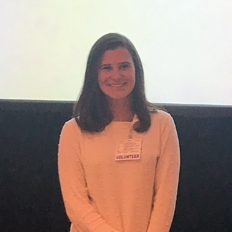Communication, Media & Design
Communication Studies | Film/Media | Journalism| Public Relations | Sports Media | Professional and Public Writing
What Can I Do With My Major?
One of the most exciting things about your major is the variety of career options you can pursue! Take a look at the materials below to learn about some of the most common career paths for your major. The infographics below are created from the information listed on What Can I Do With My Major? For even more information, take a look at Career Outlook.
Communication, Media & Design:
|
Communication Studies
|
|||
| Film/Media | |||
| Journalism | |||
|
Public Relations
|
|||
|
Sports Media
|
|||
|
Public and Professional Writing
|
|||
Student Organizations
Another great way to explore your major and career options is to get involved on campus during your time as a Harrington student. These clubs and organizations are excellent resume builders and allow you to get more experience in your field while you are on-campus. Below are just some of the options for you to be involved in. Use the same professional methods of contacting agencies as you would for internships.
Harrington Organizations
Training & Additional Education
Many roles within the communication, media & design industries require additional and/or on-going education beyond a Bachelor’s level degree. It’s important to be up-to-date on the latest techniques in your industries but even more important to do the research and ask the questions before committing and spending a large amount of money on training.
Many think that graduate school is required and that it should be completed right after completing the Bachelor degree. We encourage you to review our Grad School Module below to learn if grad school is the best fit for you.
Please note that your Career Education Specialists will assist you in finding resources for applying to grad schools (including building an effective personal statement), but do not advise on specific graduate programs. If you are interested in learning more about a specific program, contact that school’s graduate admissions office directly.
Trainings to Consider
As you become a professional in the industry that you have chosen, it is your responsibility to research what additional training you need in order to be an informed and marketable member in the field. Below are some sample online platforms, topics of training, and professional development associations to serve as guidance to find resources and opportunities. Please note that this is just a small sample due to the field consistently growing and developing.
Online Platforms for Quality Professional Development:
- Alison for an affordable alternative
- Codecademy for programming courses
- Coursera for course variety
- edX for professional certifications
- General Assembly for interaction with instructors and mentors
- LinkedIn Learning for day-to-day skill-building
- Simpliv free & low cost courses for all areas
- Skillshare for courses in creative fields
- Udacity for cutting-edge courses
- Udemy for niche courses
Sample Topics Harrington Students Should Investigate:
- Adobe Illustrator
- Adobe Premiere Pro
- Adobe Photoshop
- Database Training
- Digital Marketing
- Editing and Proofreading
- Emotional Intelligence
- Event Planning
- Google Analytics
- Google Workplace
- Grant writing
- Graphic Design
- Microsoft Office 365
- Photography
- PowerBI
- Social Media
Professional Development Organizations
Communications & Public Relations
- American Advertising Federation
- American Communication Association
- American Marketing Association
- Association for Women in Communication
- Global Alliance for Public Relations and Communication Management
- International Association of Business Communicators
- International Public Relations Association
- National Communication Association
- National Association of Government Communicators
- Public Relations Society of America
- Social Media Association
Sports Media
Searching for a Job/Internship
In order to be competitive for the job market or graduate school, prior to graduation every student should complete a practical experience, such as an internship. There are many techniques for searching for an internship! Many of your questions regarding how to search for a job or internship can be answered by reviewing the module and videos below.
Importance of LinkedIn as a Career Tool
LinkedIn is the world’s largest online professional networking platform that features resources and benefits to support professionals in all career fields. It’s important to build your LinkedIn profile now, start connecting with your peers and professional in your field(s) of interest, and conduct research for both internship/job search and overall career development!
Job and Internship Search Sites
In addition to using Handshake, here are some industry-specific boards to also check out for opportunities.
Academic Credit for Internships
The majority of Harrington students are eligible to earn academic credit for your internship experience. Speak to your academic advisor or CES to determine if you are eligible for internship credit and if it fits your academic requirements. Below you will find more information relevant to your specific academic program, including sample student internship portfolios. The ITR Internship Program is offered through the Center for Career and Experiential Education. The first step is to contact your Career Education Specialist to learn more about the ITR Internship Program.
Arts & Sciences/Harrington School Internship Fund
Internships are a great way to build experience and get a leg up on the job market. But many internship opportunities are unpaid, making them less accessible for many students. The Arts and Sciences/Harrington School Internship Fund offers $1,000 stipends for undergraduates participating in an internship opportunity. The funding can help to cover costs associated with transportation, professional attire, and food at the job site. It can also help to offset the need to work a paying job during the internship period.
ApplicationOptions for Academic Credit by Academic Program
Student Testimonials
Here’s a sample of what other Harrington students have done for their Internship for Academic Credit (through the ITR program) in the past. Learn more about how your fellow Harrington peer gained experience and credit at the same time!

My experience as an intern at Sullivan Custom planning in Providence, RI has been a great stepping stone into the professional world as I get ready to graduate this May. Not only has my experience at my internship been great, but the instruction and assignments provided through the ITR program at URI have been extremely helpful! By polishing my resume, LinkedIn profile, and creating a personal portfolio website to document my internship experience, I have many tools that will help me long after I graduate that I wouldn‘t have been able to get anywhere else.
Kelly Falco – Communications (2018)- Sullivan Custom Planning

While my internship at Quarto Group taught me a lot about the ins and outs of the publishing industry, I think the most important thing I learned came from trying to find my summer internship. I sent out maybe 30 e-mails to publishers around the Boston area, even if they weren‘t advertising for a summer intern, just on the off-chance that they might be hiring. Most of them I never received a response, until finally Quarto Group took a chance with me. This was the greatest thing that I learned during my summer at Quarto Group: perseverance and the simple reality that it may take more than a couple calls or e-mails to finally land that job or internship. I‘ll put my editing and management skills on my resume, but perseverance is what‘s going to help me get that first interview.
Lianna Blakeman – Writing & Rhetoric 2018 Quarto Group Publishing

I have learned that marketing for a hospital or any type of company takes a lot of creativity, hard work, and dedication. Those are things that you can only learn when you are in a hands on experience and not in class reading from a textbook.
Jennifer Horsfield – Communication Studies – Marketing and Communications Intern, South County Health
Resume & Cover Letter
Resume
A resume should highlight the most important information relevant to a specific job or employer, which is why each resume you write will be different. In most cases, it’s important to showcase your projects and experience that illustrate the practical application of the academic skill and knowledge you’ve acquired here at URI and within your internships.
